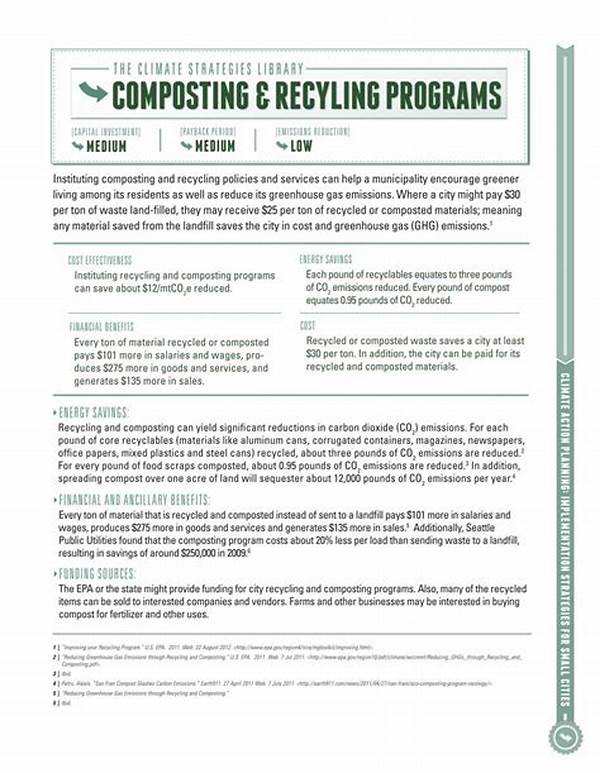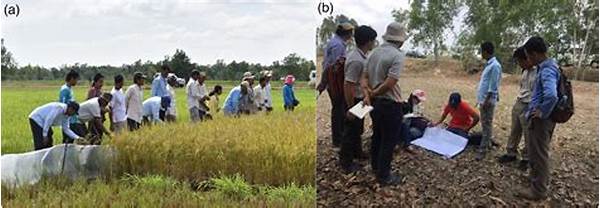Composting and recycling programs have become pivotal in our quest for sustainability and reducing environmental footprints. These initiatives are not just about managing waste; they’re about transforming waste into valuable resources. As more communities and organizations adopt these programs, the positive impacts on the environment and economy are becoming increasingly evident. The aim of composting is to convert organic waste into nutrient-rich soil, while recycling focuses on converting waste materials into new products, reducing the need for raw materials, and minimizing landfill use. Both strategies are crucial in addressing waste management challenges and promoting a circular economy.
Read Now : Chic Venue For Soirées
The Importance of Composting and Recycling Programs
Yo, let’s dive into why composting and recycling programs are the real MVPs of waste management. First off, composting is like Mother Nature’s way of dealing with organic leftovers. When you chuck banana peels and coffee grounds into that compost bin, they transform into nutrient-packed soil. Plants dig it, and it helps gardens flourish without chemical fertilizers. On the flip side, recycling is all about giving new life to old stuff. Cans, bottles, and paper get a second chance, saving energy and raw materials. These programs not only cut down on landfill size but also slash greenhouse gas emissions. Plus, they’re cash cows for creating green jobs and boosting the economy. So, whether you’re composting in your backyard or tossing recyclables in the blue bin, you’re doing the Earth a solid.
The Benefits of Composting and Recycling Programs
1. Composting and recycling programs are like environmental superheroes, turning trash into treasure and keeping Mother Earth smiling.
2. These programs save big bucks by reducing the need for waste management and creating valuable products from compost and recycled materials.
3. They help shrink landfills and make room for the important stuff.
4. By reducing the demand for raw materials, these programs conserve resources and cut back on habitat destruction.
5. Composting and recycling programs are all about teaching the community to live sustainable and eco-friendly lives.
The Challenges of Implementing Composting and Recycling Programs
Alright, let’s spill the tea on the struggles of rolling out composting and recycling programs. It’s not all sunshine and rainbows. First up, you’ve got the education curve. Not everyone knows which bin gets what trash, and that can throw a wrench in the works. Then there’s the infrastructure. You can’t just snap your fingers and have recycling plants sprout up. It takes cash and city planning to get these bad boys operational. And don’t forget the contamination issue. One pizza box soaked in grease can ruin a whole batch of recyclables. Plus, you’ve got to convince folks that composting isn’t some stinky hassle. It’s a juggling act of teaching, building, and rallying the community.
Read Now : Zero Waste Kitchen Initiatives
The Role of the Community in Composting and Recycling Programs
The lowdown on getting composting and recycling programs to work? It’s all about the community hustle. When everyone’s on the same page, the magic happens. It’s like a group project where no one’s slacking off. People gotta get savvy about sorting their trash and knowing what’s compostable and recyclable. And it doesn’t hurt to nudge your neighbors and friends into the groove. Local governments and organizations can pump up the vibes with workshops, flyers, and all. The more the community buys in, the meaner and greener the environment gets. It’s grassroots action at its finest, turning waste into wicked resources.
The Economic Benefits of Composting and Recycling Programs
Composting and recycling programs aren’t just earth-friendly; they’re wallet-friendly too. By slashing the need for trash disposal services, cities and towns can pocket some spare change. With composting programs flipping food waste into garden gold, local agriculture gets a boost without blowing cash on fertilizers. Recycling plants? Job factories! Engineering, sorting, and selling recycled materials create gig opportunities across the board. Plus, cutting down on importing raw materials saves some serious dough. Major props to these programs for keeping the cash flow local and pumping up the economy while doing right by the planet.
How to Start Your Own Composting and Recycling Programs
Ready to dive into the composting and recycling scene? First, get to know what’s recyclable and compostable in your area. You don’t want to be that person who accidentally tosses a greasy slice into the wrong bin. Next up, grab some bins or pails to separate your goodies. You can DIY a compost pile in your backyard or find a community drop-off spot. For recycling, check local guidelines because not every place takes the same stuff. Get your pals involved, start a neighborhood challenge, or spread the word online. The more peeps in the game, the bigger the impact. Keep it fun and you’ll transform waste into something rad.
Summary of Composting and Recycling Programs
Bottom line? Composting and recycling programs are the unsung heroes of waste management. They switch trash from a problem to a solution by recycling and composting stuff that would otherwise clutter landfills. It’s a clean win for the planet and the economy. These programs slice greenhouse gases and pave the way for more jobs. Yet, they aren’t without a hitch. Getting folks clued up and setting up proper infrastructure takes time and effort. But with some community spirit and savvy planning, these programs are cruising towards a sustainable future. So next time you toss something out, remember: it’s not goodbye, it’s see you in a new form!



